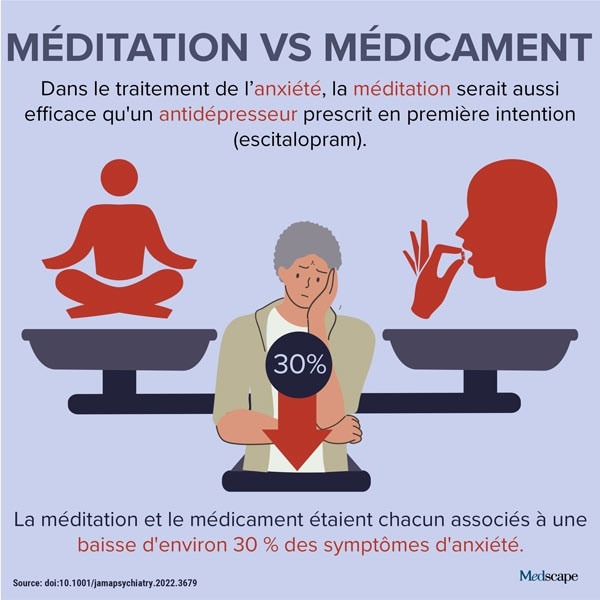More and more data continue to demonstrate the beneficial effects of medication on health. Several recent studies have compared the effectiveness of mindfulness and related strategies to that of pharmaceutical interventions in various pathologies. The results have generated a lot of interest, including those from a mindfulness-based stress reduction trial in patients with anxiety disorders.
Treatment of anxiety disorders
In study [1] involving 276 adult patients, most of whom suffered from generalized anxiety or social anxiety, participants were randomly assigned to receive a mindfulness-based stress reduction program―or MBSR for Mindfulness-based stress reduction ― (136 patients) or escitalopram (140 patients). MBSR included a weekly 2.5 hour class, a one-day weekend class, and daily 45-minute guided meditation sessions at home. The average age of participants was 33 years; 75% were female, 59% were white, 15% African American, and 20% Asian.
The primary outcome was the Clinical Global Impression of Severity Scale (CGI-S) score for anxiety. Among the 208 participants who completed the study, the mean CGI-S score at baseline was 4.44 for MBSR and 4.51 for escitalopram. At week 8, the MBSR group’s score improved by an average of 1.35 points, while the escitalopram group’s score improved by 1.43 points (difference, -0.07; 95% CI , -0.38 to 0.23; p=0.65). The lower end of the confidence interval (-0.38) was smaller than the prespecified non-inferiority margin of -0.495, indicating non-inferiority. About 78% of people receiving escitalopram had at least one treatment-related adverse event, compared with 15.4% in the mindfulness group.
In type 2 diabetes
A another recent study examined the effect of mind-body practices, including yoga and meditation, on patients with type 2 diabetes (T2D). The meta-analysis [2] included 28 studies of T2D patients, published between 1993 and 2022. The results suggest that mindfulness modalities improved blood sugar control comparable to drugs such as metformin. For all types of mindfulness interventions combined, a significant mean reduction in HbA1c of 0.84% was observed (p < 0.0001). With MBSR, HbA1c was reduced by 0.48% (p=0.03), and with meditation specifically, HbA1c was reduced by 0.50% (P=0.64). The largest drop in HbA1c was associated with yoga, where it fell by 1.00% (p < 0.0001), which corresponds approximately to the same degree of glycemic control obtained with metformin, according to the authors.
Pain management
MBSR is also effective against pain. In a test randomized, [3] over 100 healthy people were assigned to an 8-week MBSR program, an 8-week comprehensive health improvement program, or a waitlist. To examine the effect of interventions on pain experience, participants were subjected to a pain experience. They received 20 thermal stimuli applied to the wrist for 12 seconds, including 8 seconds at maximum temperature. Participants underwent MRI to assess neurological pain signature (NPS) and stimulus intensity-independent pain signature-1 (SIIPS-1) in the brain.
The MBSR group experienced a significant decrease in NPS compared to the comprehensive health improvement program group (p = 0.05) and between the pre- and post-intervention assessments (p = 0.023). Individuals in the MBSR group also had “marginal” decreases in NPS compared to the Wait List group (p=0.096) and SIIPS-1 compared to the Global Program (p=0.089) and waiting list (p = 0.087). Regarding subjective pain ratings, the MBSR group experienced a marginal decrease compared to the waitlist group (p = 0.078) and between pre- and post-intervention ratings (p = 0.028). In addition, “seasoned” meditators with at least three years of meditation experience showed a significant reduction in the intensity and unpleasantness of pain (p < 0.001).
Sign up for Medscape newsletters: select your choices
Follow Medscape in French on Twitter, Facebook and LinkedIn.
We would love to give thanks to the writer of this post for this outstanding material
In the News: meditation vs medicine
Visit our social media profiles and other pages related to themhttps://nimblespirit.com/related-pages/

